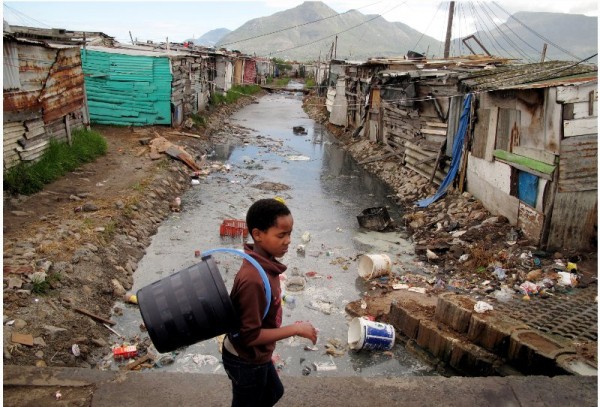
One of the four canals in Masiphumelele where human waste is being thrown. Picture: Masixole Fani
23 August 2017
The City of Cape Town has “failed to adequately address the appalling unhygienic conditions in Masiphumelele township, which is affecting the health and wellbeing of the residents and causing significant pollution and/or degradation of the environment”, wrote the Western Cape Government in a scathing directive issued in July.
This is the second directive this year from the provincial government to the City of Cape Town to clean up Masiphumelele wetlands informal settlement. The Constitution (section 139) empowers a provincial government to issue a directive to a municipality if it has not met its obligations.
The first directive was issued in January and the second one in July, by the provincial director of Environmental Law Enforcement, Dr Eshaam Palmer, to the City’s Executive Director of Informal Settlements, Water and Waste Management, Dr Gisela Kaiser.
The informal settlement in Masiphumelele has approximately 2,422 households according to the City of Cape Town.
For years residents have been demanding better living conditions. The area has 233 communal toilets, and no drainage system. There are four open canals in the settlement in which waste is thrown. These flood into people’s houses in the rainy season and smell in summer.
In the directive Palmer says the City has failed to address issues in Masiphumelele affecting the health and well-being of the residents and causing pollution to the environment. The City had failed to comply with Section 28(1) of the National environmental Management Act (NEMA) 1998, he says.
He said that in two site visits to the area in July, the Province found that the City had failed to provide toilets, ablution, washing and storm-water management facilities as well as proper solid waste management services.
The City was then directed to repair all the blocked toilets, provide additional toilets, and dredge the canals every two months. It was also ordered to provide timeframes for clean-up operations, inspections and maintenance of the storm-water canals, toilets and standpipes.
Mayco Member for Informal Settlements, Xanthea Limberg, said the City had appealed against the directive “on numerous grounds, including that we are already attending to the issues in conjunction with the Western Cape Government and the National Government.”
She said the City was doing its best to improve conditions for residents. “However the settlement is situated on a wetland, and it is therefore not possible to develop/engineer the area much more than has been done already.”
The City has offered portable flush toilets but some residents are unhappy with them.
When asked what measures had been taken to address the issues raised in the directive, Limberg said that approximately R1 million had been spent since March 2017 on cleaning the stormwater canals. “Dredging of canals is currently carried out quarterly, or more frequently if budget allows. It should be noted that dredging operations are rendered difficult by the density of human settlement in the area. We are currently looking to the option of deepening the outlet channels into the wetlands by making use of an amphibious excavator,” said Limberg.
Palmer said the directive remained in force till the outcome of the appeal and the City was obliged to adhere to the instructions in the Directive.
“Compliance monitoring will be conducted by this Department to ensure the City follows the instructions contained in the directive. Should the City fail to comply with the directive, the matter may be referred to this Department’s Criminal Investigations unit for criminal investigation,” he told GroundUp.